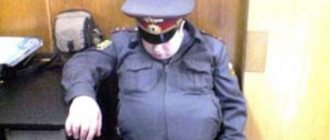The task of the police in the Russian Federation is to ensure law and order. These are phenomena of paramount importance that are necessary for the stability of the social and state system.
In this regard, in our country, police officers have fairly broad powers. In particular, among other things, they have the right to briefly restrict the freedom of citizens, if necessary, detaining them and placing them in temporary detention centers.
However, these actions must be justified, and they must be performed in strict accordance with current legislation. The peculiarities of the order and how long the police can detain will be discussed later in the article.
How long can they be kept in the precinct?
The main legal acts that regulate the procedure and time of detention are the Criminal Procedure Code of the Russian Federation (CPC RF), Federal Law “On Police” No. 3-FZ of 02/07. 2011, as well as the Code of Administrative Offenses of the Russian Federation (CAO RF).
Free legal consultation
+8 800 100-61-94
Detention itself should be understood as a measure of procedural coercion, consisting in a short-term restriction of a citizen’s freedom.
Attention! Only law enforcement officers can make arrests. Restriction of freedom by persons who are not authorized by law to perform this action is unlawful.
Since the procedural procedure under consideration involves a significant loss of citizens’ rights, the period for which the restriction of freedom can be applied is extremely important. It is established by the Constitution of the Russian Federation, as well as the above-mentioned normative documents, which should not contradict it.
Thus, Article 22 of the country’s Basic Law states that arrest and restriction of freedom are possible only on the basis of a court decision. Without judicial authorization, no one can be detained for more than 48 hours.
Thus, the maximum time of police detention cannot exceed two days. In exceptional cases, this period may be extended to 5 days. However, it should be borne in mind that the decision on such an extension is made exclusively in court.
Upon expiration of the period of detention, the following decisions may be made in relation to the detainee:
- release from custody;
- detention and redirection to a pre-trial detention center or special detention center of the Ministry of Internal Affairs;
- choosing a preventive measure not related to isolation from society.
The corresponding date and time when the detention was carried out are recorded in the protocol drawn up at the time of this procedural procedure.
Use of physical force against a detainee
A police officer has the right to use physical force against a person subject to arrest for the purposes of:
- suppression of a crime or administrative offense;
- delivery and detention;
- overcoming opposition to his legitimate demands.
In other cases, the employee does not have the right to physically influence the detained citizen.
Before using physical force, the employee is obliged to warn about this and provide the person with the opportunity to voluntarily comply with his demands. Without warning, a police officer may use force only in a situation where delay could endanger the lives of others or his own.
To suppress resistance to the actions of a police officer, special means can be used on a detained person - sticks, stun guns, handcuffs and others.
Reasons for detention
There is an opinion in society that police officers have every right to make a detention or arrest without any valid reason. Indeed, situations often arise when police officers exceed their official powers established by law. This is completely illegal and unacceptable.
However, current legislation strictly limits the list of grounds on which a person can be limited in his freedom. It is contained in Article 14 of the Federal Law “On Police”. These, first of all, include:
- determining the identity of a person suspected of entering objects subject to protection;
- suspicion of committing a criminal offense;
- capture of a wanted person;
- capture of persons evading serving administrative arrest;
- capture of persons who escaped from psychiatric hospitals and pose a threat to society due to the presence of a mental illness;
- attempt to hide from a police officer.
This list is not exhaustive. In addition, the police have the right to detain citizens who are heavily intoxicated with alcohol or drugs in the event of a threat to public order.
In general, there are quite a few reasons for detention, but each case must have a legal justification. If a citizen was limited in his rights without good reason, this is a gross violation of the law , and police officers guilty of exceeding their powers may be held accountable for their actions.
What not to do
To prevent simple detention from becoming a reason for initiating criminal proceedings, the detained person should under no circumstances:
- shout or insult an employee;
- try to escape or escape;
- use physical force against a police officer;
- resist the employee's demands;
- touch foreign objects in the investigator/interrogator’s office;
- sign documents without a lawyer (if you disagree with the contents of the document, sign the document only with a handwritten note “disagree with...”);
- lie or invent facts that did not exist.
There is also no need to provoke employees into conflict or threaten them. A policeman is the same person, and he also has the right to be treated with respect.
Attempting to escape or resisting employees will be considered disobedience to legal requirements. Such an offense is punishable by a fine of 1,000 rubles or arrest for up to 15 days.
Detention procedure
The procedure in question has a specific procedure established by law
Reference! Violation of the procedure for carrying out detention is grounds for declaring it illegal.
So, at the time of arrest, the police officer is obliged to introduce himself and also clarify to the person undergoing the procedure his motives and circumstances.
After this, the citizen is taken to the police department. If necessary, he may be subjected to personal search.
Upon arrest, a protocol is drawn up. This is a standard document in which the following information is required:
- place and date of compilation;
- Full name, position of police officer;
- Full name of the detained citizen, as well as the address of his place of residence;
- time of the procedural procedure (indicating hours and minutes);
- the grounds that led to the person being brought to the police;
- information about the citizen’s state of health at the time of arrest;
- comments of the detained person, for example, here he may express disagreement with the motives for restricting freedom;
- signatures of the police officer and the detained citizen.
A person who has been detained by a police officer has the right to refuse to sign the protocol. In the latter case, the corresponding mark is entered into it. Coercion to sign the protocol is unacceptable.
It has been established that the drawing up of a protocol must be carried out within 3 hours after the actual restriction of a citizen’s freedom. In addition, law enforcement agencies must notify the prosecutor of the fact of carrying out this action. The period within which notification must be made cannot exceed 12 hours.
If a minor citizen is detained, then his parents or other legal representatives must be notified of this fact. In addition, the command of the army or navy unit is notified if the detainee is a military personnel, and the representative office of a foreign state if the detainee is a foreigner.
After being delivered to the police, the detainee is interrogated. It must be carried out no later than 24 hours after delivery to the department.
For 48 hours
Restriction of freedom without judicial sanction for 48 hours is the maximum period. The reasons for this may be the following:
- capture of a wanted person;
- detection of a person at the scene of a crime in the process of committing it;
- detection of traces of a crime on a suspect, on his belongings or in his home.
In addition, it is necessary to highlight the administrative basis for restricting freedom for 48 hours, which is identification of individuals for violations related to violation of migration legislation.
Important! A foreign citizen is also detained for this period before administrative deportation from the country.
For 3 hours
A citizen can be detained for 3 hours if the person is suspected of committing an administrative offense. In this case, the circumstances do not allow drawing up a report and, for example, issuing a fine at the place where the act was committed.
Separately, mention should be made of citizens who are detained while heavily intoxicated. The corresponding three-hour period for them begins to run from the moment the effect of the alcohol or drug ceases . At the same time, the total period of detention of such persons cannot exceed 48 hours, but only if the court has not made a decision on administrative arrest.
Illegal detention of a lawyer and coercion to testify
June 11, 2021 8:24 pm
The lawyer was removed from the case, forcibly interrogated as a witness in the case of his client
On June 10, lawyer of the Irkutsk Region Administrative Office Dmitry Dmitriev appealed to the Administrative Office of the Irkutsk Region and the Federal Chamber of Lawyers with a report of a gross violation of his rights by the investigator, who removed him from participation in the case under the pretext of interrogation as a witness.
In appeals to the FPA and the regional chamber, the lawyer indicated that the investigator had deceitfully summoned him to the IC, allegedly to participate in investigative actions and, depriving him of the opportunity to leave the office, forced him to testify. In a commentary to AG , lawyer Dmitry Dmitriev said that he had already appealed to the court the actions of the investigator and the decision to disqualify him from participation in the criminal case.
In turn, the President of the Administration of the Irkutsk Region Oleg Smirnov said that the situation under consideration requires a detailed investigation. The lawyer reported that since February 21, he has been providing legal assistance to convict B., held in IK-6 of the Federal Penitentiary Service of Russia in the Irkutsk Region. According to Dmitry Dmitriev, in January his client was subjected to physical and sexual violence, which was condoned by employees of the institution’s administration. In connection with the incident, a criminal case was initiated under Art. 132 of the Criminal Code, according to which B. was recognized as a victim.
The case was accepted for proceedings by the investigator of the third department of the Investigative Committee of the Investigative Committee for the Irkutsk Region, Olga Kovaleva. According to the lawyer, his client repeatedly wrote applications to the investigator for the admission of Dmitry Dmitriev to participate in the case as a representative of the victim, but only on April 15 Olga Kovaleva granted the lawyer’s request for access to the victim and recognized him as a representative. At the same time, she refused to allow him to familiarize himself with the protocols of investigative actions involving B.
In his appeals, the lawyer indicated that throughout the entire period of investigation, Olga Kovaleva did not inform him about the investigative actions being carried out with his client, thereby violating the latter’s rights. Only in June did she call Dmitry Dmitriev and inform him that on June 4, B. would be interrogated as a victim in the premises of IK-6, in connection with which the lawyer should appear there at the appointed time. “At the same time, Kovaleva knew for sure that the interrogation of Bakiyev would not take place and she did not plan to do so. In fact, the investigator planned to interrogate me on the territory of the correctional colony,” the lawyer’s messages noted.
Dmitry Dmitriev explained that for this purpose the investigator prepared a false report addressed to the head of the colony, in which she indicated the need for a lawyer to participate in the investigative actions. Using her official powers, she took him to the restricted territory of the Correctional Institution, where he had to hand over his phone and where he could not move freely without escort. “Having escorted me to the headquarters of the correctional institution, Kovaleva took me into the operative’s office, where she illegally and without my consent pointed a switched-on video camera at me and began my interrogation as a witness in criminal case No. <...>, in which I have the status of a representative the victim and by virtue of paragraph 3 of Part 3 of Art. 56 of the Code of Criminal Procedure of the Russian Federation, I cannot be questioned about the circumstances of the provision of legal assistance,” Dmitry Dmitriev indicated in his appeals.
He also noted that he could not leave the office and leave, i.e. was actually detained by the investigator, who forced him to give testimony. Despite the fact that Dmitry Dmitriev did not answer questions, the investigator handed him a summons for June 7 to continue the interrogation and issued a decision to remove him from participation in the criminal case.
In this regard, the lawyer asked the FPA and the Administrative Office of the Irkutsk Region to assist him in protecting his professional rights by sending an appeal to the head of the Investigative Committee of the Investigative Committee for the Irkutsk Region to conduct an audit of the actions of the investigator for the commission of a number of crimes (abuse of authority, official forgery, illegal detention and coercion to testify), criminal liability for which is established by Art. 286, 292, 301, 302 of the Criminal Code of the Russian Federation.
In a commentary to “AG”, Dmitry Dmitriev assessed the actions of Olga Kovaleva as obstruction of the lawyer’s professional activities. “The motive for committing such actions is, in my opinion, the investigator’s desire to evade the resolution of the lawyer’s well-founded requests to qualify the act, to bring to justice all the guilty persons, and not just those “appointed” by the investigation. My recusal was preceded by my active position on bringing to justice all employees of IK-6 who are guilty of abuse of official powers. This case only illustrates the desire of the investigation to conduct an objective investigation not in the interests of the victim, but in the interests of the head of the investigative agency,” he noted. The lawyer added that he filed a complaint with the court against the actions of the investigator and against the decision to disqualify him as a representative of the victim from participation in the criminal case in accordance with Art. 125 Code of Criminal Procedure.
The President of the Irkutsk Region Administration Oleg Smirnov confirmed that the chamber is aware of the situation, but refrained from commenting, explaining that the lawyer’s appeal was received only on June 10, and what happened requires a detailed investigation.
Zinaida Pavlova
SharePrint Direct link to the material:
Share
Rights of the detainee
Every detainee has rights defined by law, which must be strictly observed. Thus, the Constitution of the Russian Federation establishes that citizens have the right to receive qualified free legal assistance.
In addition, constitutional norms guarantee that a person placed in custody has the right to use the services of a lawyer. Thus, at any time, a detained person has the right to communicate with a lawyer related to the circumstances of his case.
If the detainee does not speak Russian, then he must be provided with an interpreter . In addition, detainees have the right to a telephone call. For example, it is enshrined in Article 14 of the Federal Law “On Police”. Thus, detainees can notify their relatives or lawyer about the fact of detention. The exercise of this right is carried out within 3 hours after delivery.
When detained, detainees must be kept in premises where the conditions exclude a threat to the life and health of citizens. In addition, they are provided with food and medical care if necessary.
How the procedure works
The procedure is regulated by Art. 14 of Law No. 3-FZ. When arresting a police officer, he must:
- introduce yourself;
- present your official ID;
- state the reason for the appeal;
- explain the rights and obligations of the detainee;
- draw up a detention report.
When carrying out the procedure, the police officer must observe and respect the rights of the citizen. An employee is strictly prohibited from humiliating a person, resorting to physical violence or cruel treatment.
If the detained person has personal belongings or vehicles with him, they may be subject to search by an officer. In this case, the police officer is obliged to ensure the presence of at least 2 witnesses or conduct a video recording of the search.
If the employees searched the personal belongings of the detained person, then a record of this is made in the arrest report, or a separate document is drawn up - the search report, in which the witnesses put their own signatures.
Personal search of a citizen by a person of the opposite sex is not allowed, that is, a woman should be searched by a woman, and a man by a man.
After arrest, the citizen is taken to the police department, where he is placed in a specially designated room, having previously been examined for beatings, abrasions or other bodily injuries.
How to behave when arrested
It is very important, especially if the arrest occurred without reason, to know your rights:
- Be informed of the reason for the arrest.
- To communicate about your rights and responsibilities.
- To use medical care if necessary.
- Review the protocol, demand a copy of it, refuse to sign it and provide testimony, and even have the right to make your own adjustments to the protocol.
- To challenge the unlawful behavior of the employees who took part in this arrest.
- To notify the next of kin about the current state of affairs, as well as managers in the field of primary activity and a personal lawyer.
- To any conditions specified in the law, including the period of detention, as well as the absence of cruel treatment.
To prevent the situation from becoming even more complicated , when detained and taken to the police station, it is necessary to establish contact with your relatives and describe to them your situation and whereabouts. The best option would be if they have an idea of who and where to contact in this case (lawyer, lawyer, etc.)
Important! As a “prevention”, you should always have at least some documents with you. And if the original passport can be taken away, then a copy of it will allow you to avoid detention to establish your identity.
Upon arrival at the point of delivery of the detained citizen, a protocol will be created.
You need to read it carefully and compare the data with the actual state of affairs.
In any case, this paper will be certified by witnesses, and the presence of the detainee’s signature does not admit his guilt.
All you have to do is add a refusal to testify before negotiations with a personal lawyer and a request to consider this case at your place of residence.
A photocopy of the protocol must be provided to the detainee , otherwise this fact should be added to the postscript to the protocol.







